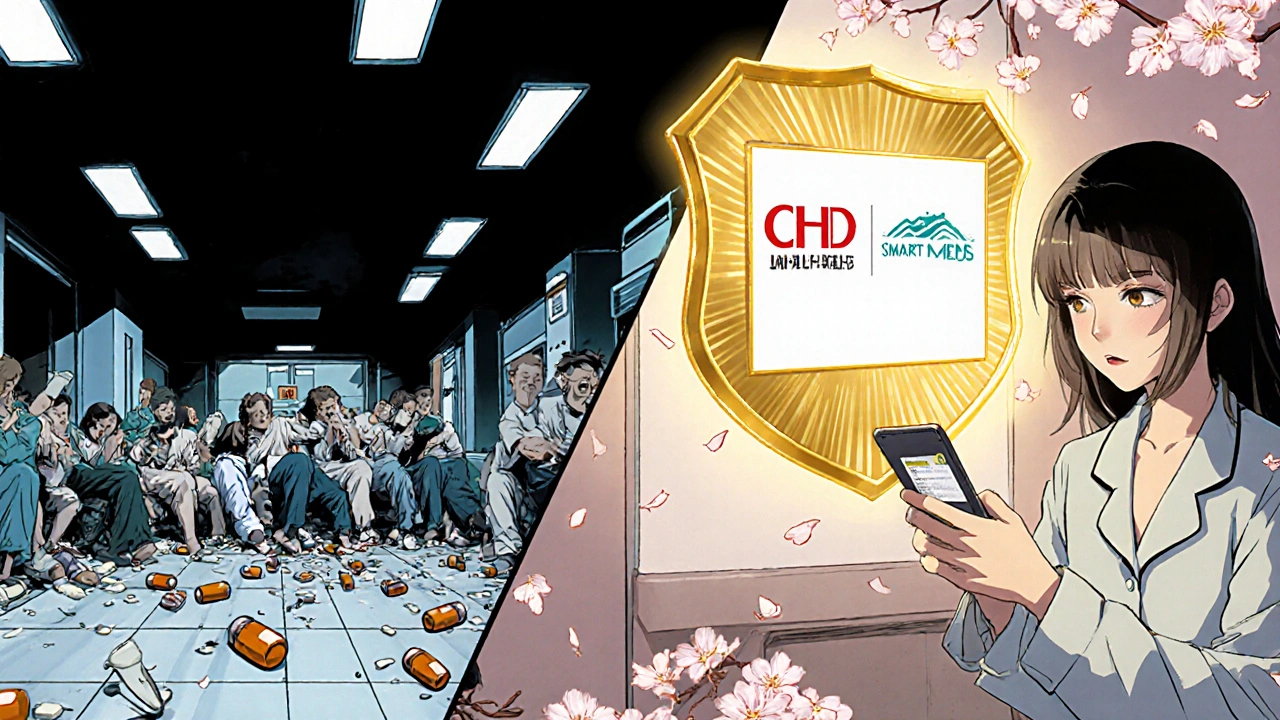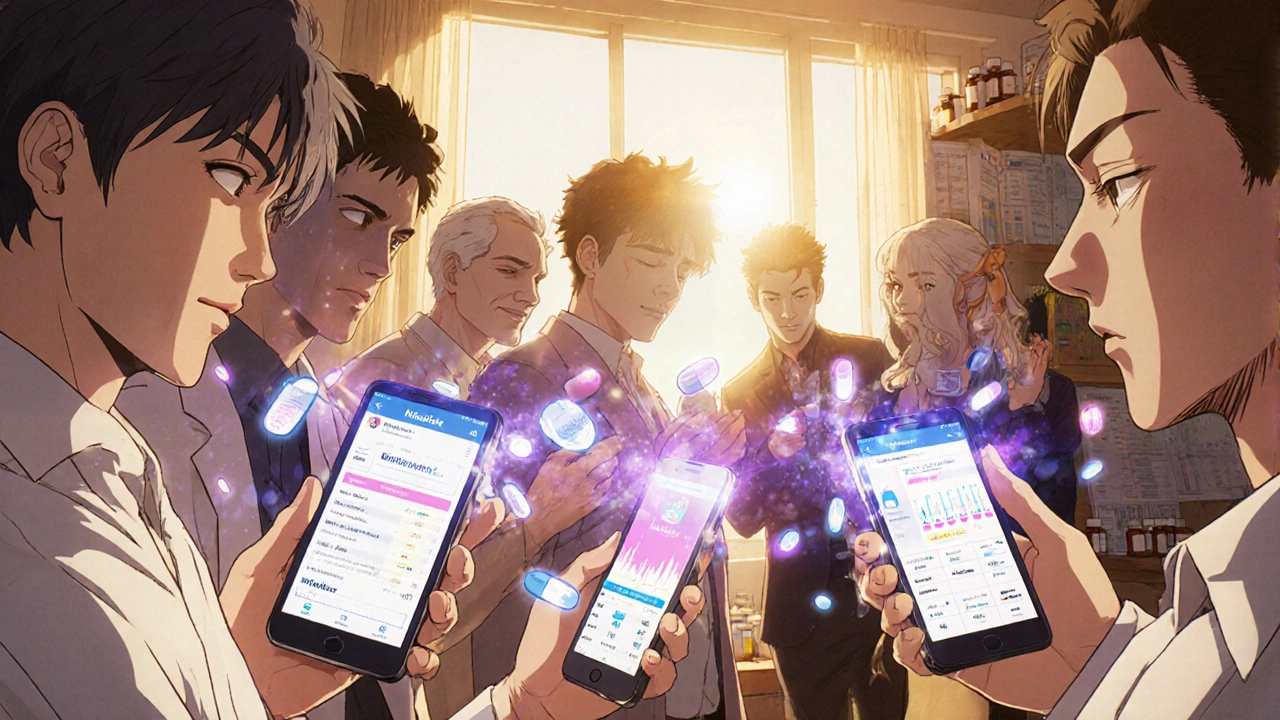Missing a dose of your blood pressure medicine. Forgetting your diabetes pills over the weekend. Skipping your antidepressant because you felt fine yesterday. These aren’t just small mistakes-they’re common, costly, and dangerous. Around 50% of people with chronic conditions don’t take their meds as prescribed. That’s not laziness. It’s forgetfulness, complexity, or feeling fine and thinking, “I don’t need it today.” The result? Hospital visits, worsening health, and over $300 billion wasted in the U.S. alone each year.
Thankfully, digital tools are stepping in. Medication reminder apps aren’t just fancy alarms anymore. They’re smart, personalized, and backed by real science. In 2025, the best ones don’t just ping you-they understand you.
How These Apps Actually Work
At their core, medication reminder apps are digital assistants built into your phone. You add your pills-name, dose, time, frequency-and the app sets alarms. But the good ones go further. They track whether you’ve taken your medicine, log side effects, warn about interactions, and even sync with your doctor’s records. Most work on both iOS (13.0+) and Android (8.0+), and they store your data securely with AES-256 encryption and HIPAA compliance.
Unlike simple alarm clocks or old-school pill organizers, these apps learn. They notice if you usually skip your evening pill on Fridays. They adjust reminders if you travel across time zones. Some even use AI to predict when you’re likely to miss a dose-before you do.
Studies show these tools work. A 2025 review of 14 apps found that 10 out of 14 randomized trials showed clear improvement in adherence. Patients using apps were about twice as likely to take their meds correctly compared to those who didn’t. One study in federally qualified health centers found a 43% boost in adherence among app users-nearly five times better than the control group.
What Makes One App Better Than Another
Not all apps are created equal. The difference between a good app and a great one comes down to personalization.
Apps like Medisafe is a leading medication management app that offers customizable reminders, medication tracking, and integration with electronic health records. Also known as Medisafe Health, it was launched in 2012 and now supports over 15 million users worldwide. let you set different alert tones for morning vs. night meds, add notes like “Take with food,” and even let family members get alerts if you miss a dose. Their 2025 update added AI-driven predictions that cut missed doses by 15% in early testing.
MyTherapy is a digital health tool that tracks medications, symptoms, and mood with visual reports and customizable reminders. It is widely used by patients with chronic conditions such as diabetes, hypertension, and depression. stands out for its clean timeline view-you scroll back to see exactly when you took your last pill. Users love how it turns adherence into a visual habit, not just a checklist.
Then there are apps built for specific conditions. MedApp-CHD is a condition-specific digital tool designed for patients with coronary heart disease, offering tailored medication schedules and educational content. doesn’t just remind you to take your statin-it explains why it matters for your heart, links to videos from your cardiologist, and tracks blood pressure logs you enter manually. For someone managing heart disease, that context makes a huge difference.
Even gamification is showing results. The Smart-Meds is a pilot study app that uses narrative-based gamification to improve medication self-efficacy in post-acute cardiac patients. app turned taking meds into a story-each dose unlocked part of a character’s journey. Patients didn’t just remember-they felt motivated. That’s not fluff. It’s behavioral science in action.
Who Benefits the Most-and Who Doesn’t
These tools work best for people with complex regimens: five or more pills a day, multiple conditions, or meds with strict timing rules. But they’re not magic.
Older adults, especially those over 65, are the group that needs these apps most. Yet only 29% of them use them, compared to 68% of people under 50. Why? Many feel overwhelmed by tech. A 2023 study found that seniors needed about 22 minutes to set up their first app-and that’s with help. But here’s the surprise: once they got past the setup, attrition was low. They stuck with it. The problem isn’t digital literacy-it’s access and support.
People with low income or unstable internet face bigger hurdles. If your phone dies and you can’t recharge, or your data plan runs out, the app becomes useless. And if your doctor’s office doesn’t integrate with the app, your progress stays siloed.
Some users report battery drain or missed notifications. That’s real. One in four iOS users complained about battery life. Over 30% of Android users mentioned notifications not coming through. These aren’t deal-breakers-but they’re reasons to pick an app with strong reviews and active updates.

The Top Apps in 2025
Out of 1,200+ medication apps on the App Store and Google Play, five dominate. They’re not just popular-they’re proven.
- Medisafe - Best overall. Customizable alerts, family sharing, EHR integration, AI predictions. Rated 4.7/5 on iOS.
- MyTherapy - Best for tracking. Clean interface, mood and symptom logging, visual progress charts. Rated 4.6/5 on Android.
- Round Health - Best for caregivers. Lets multiple people manage one patient’s regimen. Great for aging parents.
- CareZone - Best for organizing. Stores pill bottles, insurance info, pharmacy contacts-all in one place.
- Mango Health - Best for rewards. Earn gift cards for consistent adherence. Appeals to people who respond to incentives.
None of these are perfect. But each solves a specific problem. If you need help remembering, go for Medisafe. If you want to understand your patterns, choose MyTherapy. If you’re managing someone else’s meds, Round Health is the clear pick.
What to Look for When Choosing
Before downloading anything, ask yourself:
- Can I set different reminders for different times of day?
- Can I add notes or photos of my pills?
- Does it let me share access with a family member or caregiver?
- Is it compatible with my phone’s OS?
- Does it sync with my pharmacy or doctor’s system? (Look for FHIR or HL7 integration)
- Are updates frequent? (Apps that haven’t been updated in 2+ years are risky)
Also, check reviews-not just the stars, but the comments. Look for mentions of “notifications working,” “easy to set up,” or “helped me stop missing doses.” Avoid apps with dozens of complaints about crashes or no customer support.

How to Get Started
Setting up an app takes time-but it’s worth it. Here’s how to do it right:
- Write down every medication you take-name, dose, time, purpose.
- Download one app (start with Medisafe or MyTherapy).
- Input your meds one by one. Don’t rush.
- Set reminders for each pill. Be specific: “8 AM with breakfast,” “9 PM before bed.”
- Turn on notifications and test them.
- Ask a family member to get access so they can nudge you if you miss a dose.
- Use it for 30 days. Don’t judge after one week.
Most people master the basics in 3-5 uses. Advanced features like interaction checks or mood logs take longer-but you don’t need them right away.
The Bigger Picture
These apps are part of a $7.3 billion market growing fast. Health systems are starting to pay for them. In 2025, 47% of U.S. hospitals have rolled out digital adherence tools. Some insurers now cover them as part of chronic care programs.
But the real win isn’t the money. It’s the health. One user on Reddit said, “I missed three doses last year. This year? Zero. I feel like I’m in control again.” That’s what matters.
Medication adherence isn’t about being perfect. It’s about being consistent. And with the right tool, consistency becomes easy.
Do medication reminder apps really work?
Yes. Multiple studies show they improve adherence by 30-50% compared to no tools. A 2025 review found 10 out of 14 clinical trials reported statistically significant improvements. Apps outperform simple SMS reminders and traditional methods like pill organizers. The key is choosing one that fits your routine and using it consistently.
Are these apps safe and private?
Top apps like Medisafe and MyTherapy follow HIPAA standards. They use AES-256 encryption for stored data and TLS 1.2+ for data in transit. Your information isn’t shared with third parties unless you allow it. Always check the app’s privacy policy and avoid apps that ask for unnecessary permissions like location or contacts.
Can I use these apps if I’m over 65?
Absolutely. While only 29% of adults over 65 use them, those who do report high satisfaction. The biggest barrier isn’t age-it’s setup support. Many seniors need help installing the app and entering their meds. Once set up, they use it regularly. Ask a family member, pharmacist, or community health worker to help you get started.
What if I forget to take my pill and the app reminds me later?
Most apps let you log late or missed doses. This isn’t a punishment-it’s data. The app uses that info to adjust future reminders. For example, if you often take your pill at 10 PM instead of 8 PM, it might shift the alert. Logging missed doses helps you and your doctor spot patterns and make changes.
Do I need to pay for these apps?
Most core features are free. Medisafe, MyTherapy, and CareZone offer free versions with reminders, tracking, and basic reports. Premium upgrades ($3-$5/month) unlock family sharing, advanced analytics, or EHR sync. If you’re on Medicare or Medicaid, ask your provider-some plans now cover app subscriptions as part of chronic disease management.
Can these apps talk to my doctor or pharmacy?
Some can. Medisafe and CareZone integrate with FHIR-based EHR systems used by major hospitals and pharmacies. This means your adherence data can be shared securely with your care team. But not all providers use compatible systems. Check with your doctor’s office before assuming it will sync automatically.
What if I travel across time zones?
Good apps automatically adjust reminders based on your phone’s location. If you’re flying from Sydney to New York, your 8 AM pill will still trigger at 8 AM local time. Just make sure location services are on and your phone is set to update time automatically.
Are there apps for specific conditions like diabetes or high blood pressure?
Yes. Apps like MedApp-CHD are built for heart disease. Others focus on diabetes, epilepsy, or HIV. These include condition-specific education, symptom trackers, and reminders tied to lab results or meal times. If you have a chronic condition, search for apps labeled for your disease-they’re often more effective than general ones.
If you’re taking multiple medications, a digital reminder isn’t a luxury-it’s a lifeline. The right app doesn’t just help you remember. It helps you feel in control, safe, and confident. Start small. Pick one. Set it up. Give it two weeks. You might just find yourself taking your meds without even thinking about it.


David Barry
November 11, 2025 AT 04:54Alex Ramos
November 13, 2025 AT 01:42edgar popa
November 14, 2025 AT 15:32Benjamin Stöffler
November 15, 2025 AT 01:46Mark Rutkowski
November 16, 2025 AT 14:11Ryan Everhart
November 17, 2025 AT 10:35Alyssa Lopez
November 19, 2025 AT 06:19Amie Wilde
November 20, 2025 AT 02:59Gary Hattis
November 20, 2025 AT 15:51Esperanza Decor
November 20, 2025 AT 16:31Deepa Lakshminarasimhan
November 22, 2025 AT 07:28Erica Cruz
November 24, 2025 AT 06:50Chrisna Bronkhorst
November 25, 2025 AT 22:27Johnson Abraham
November 26, 2025 AT 15:20Eve Miller
November 27, 2025 AT 12:41